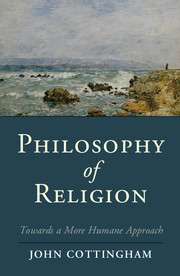1 - Method
Published online by Cambridge University Press: 05 September 2014
Summary
Legoito d'an hikanōs ei kata tēn hypokeimenēn hylēn diasaphētheiē. (‘Our discussion will be on the right lines if it illuminates things in a way that is appropriate to the subject-matter in question.’)
AristotleThe Nature of the Subject
The philosophy of religion has unique attractions. At a time when academic philosophizing has become increasingly fragmented, separated off into a host of specialisms preoccupied with narrow programmes of ‘research’, the philosophical study of religion has a stimulatingly wide purview and necessarily connects us with a whole spectrum of inquiries. It embraces practical moral questions (about how we should live our lives), as well as more theoretical moral issues about the objectivity of morality and the source of moral value; it takes us into the philosophy of mind – questions about the nature of the self and consciousness, and the extent to which we are ultimately responsible for our character and actions; and it delves into cosmological questions about the ultimate source of our world and of human existence. But perhaps most strikingly, it is concerned with our overall view of the nature of reality. Hence, it necessarily resists division into hermetically sealed subdisciplines, and instead keeps alive the traditional grand vision of philosophy as the attempt to achieve a comprehensive ‘synoptic’ vision of things – one that endeavours to discern how (or how far) the different areas of our human understanding fit together.
These grand holistic questions are ones that many contemporary analytic philosophers are wary of; understandably enough, the needs of gaining a doctoral qualification and making one's career in a competitive academic world are apt to lead people to retreat into specialized niches where they can gain a respected expertise in a narrow area. There is surely nothing wrong with this specialisation as such – indeed, it can yield significant scholarly dividends. But for all that, I suspect that many people still retain something of the drive that led them to philosophy in the first place: an urge to deepen their understanding of what meaning, if any, their lives as a whole may have, or what kind of overall vision of reality may be possible. And sooner or later, this quest, the quest that has always been at the heart of the philosophical enterprise, is likely to draw us into the grand questions tackled by philosophy of religion.
- Type
- Chapter
- Information
- Philosophy of ReligionTowards a More Humane Approach, pp. 1 - 24Publisher: Cambridge University PressPrint publication year: 2014

